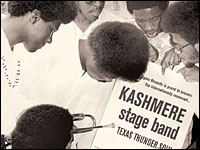 From All Things Considered (June 3, 2005) comes Bob Mondello's remembrance of James Dean, the actor who became an icon after making only three movies. Also from the same year (the 50th anniversary of Dean's death) comes this second piece by Steve Proffitt.
From All Things Considered (June 3, 2005) comes Bob Mondello's remembrance of James Dean, the actor who became an icon after making only three movies. Also from the same year (the 50th anniversary of Dean's death) comes this second piece by Steve Proffitt.Musings
- Some, possibly even much, of Dean's appeal seems to be visual--capturing a certain look. Here's just one online gallery, the JamesDeanGallery.com, or, perhaps even more iconic, a collection of art posters. How does these images relate to traditional notions of masculinity, then or now?
- Dean is forever associated with the phrase "rebel without a cause." What does this phrase mean to you?
- In the film, Rebel Without a Cause, Dean's character, Jim Stark, occupies a difficult and increasingly dangerous relationship with the real guys, the "tough guys," of his high school. What role did seemingly strong guys play in your high school in deciding who or what was "cool"?



